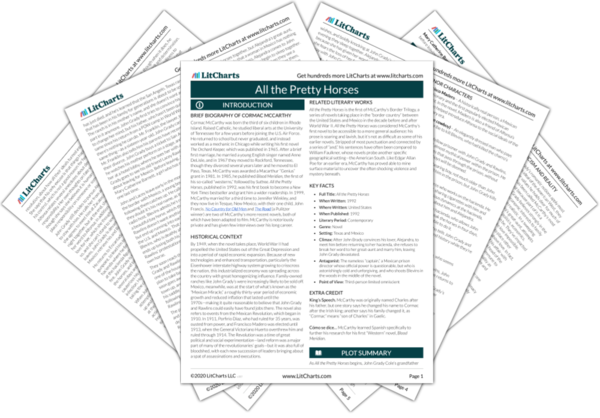Most readers of Cormac McCarthy will already be familiar with his setting—southern Texas and northern Mexico—from the long tradition of American Westerns, filled with cowboys and gunfights on wide-open terrain. By the time the novel takes place, in 1949, this world is no longer to be found in Texas. Instead it has become a myth, one filled with powerful values of freedom and honor, which John Grady Cole and Lacey Rawlins set off in search of in Mexico—but what they find is a much grimmer, coarser world. When the novel opens, John Grady’s long family line of ranchers has begun to disintegrate, and though he’s desperate to keep the family ranch going, he’s too young to take it over. In 1949, as the United States is growing increasingly industrialized, Mexico seems to be a country where John Grady can revive a way of life that is dying out back home.
Neither John Grady nor Rawlins, however, can ever seriously articulate why they’ve gone off to Mexico. Several times they tell other characters that they’re bank robbers or bandoleros. At one point a jail captain questions why they’d want to take care of horses in Mexico for four times less money than they could get in the States. In fact, neither of the boys sets out with a serious plan for their time in Mexico. Instead, the country serves as a place of exciting escape, populated by bank robbers and cowboys. McCarthy’s lush descriptions of the plains and vistas of Mexico only underline the boys’ mythical vision of the country, to which physical beauty, beautiful girls, freedom of movement, and a simpler way of life all contribute. Indeed, while their idea of the American (that is, North American) West is thrilling, it’s also largely benign: it’s a place where they can sharpen their sense of independence and adhere to a worldview of honor and dignity. The problem is that the boys don’t understand until too late that the stakes are higher than this, and that the mythical ideals they’re seeking in Mexico contain a brutal underside of violence, misogyny, and corruption. Mexico may hold the ideals of the old West, but it’s also a place of extreme inequality, endemic poverty, and terrible corruption. By experiencing this side of Mexico first hand, the boys come to be disillusioned, understanding the myth of the West as just that—a myth.
The Idea of the American West ThemeTracker

The Idea of the American West Quotes in All the Pretty Horses
What he loved in horses was what he loved in men, the blood and the heat of the blood that ran them.
They heard somewhere in that tenantless night a bell that tolled and ceased where no bell was and they rode out on the round dais of the earth which alone was dark and no light to it and which carried their figures and bore them up into the swarming stars so that they rode not under but among them and they rode at once jaunty and circumspect, like thieves newly loosed in that dark electric, like young thieves in a glowing orchard, loosely jacketed against the cold and ten thousand worlds for the choosing.
He said that war had destroyed the country and that men believe the cure for war is war as the curandero prescribes the serpent’s flesh for its bite. He spoke of his campaigns in the deserts of Mexico and he told them of horses killed under him and he said that the souls of horses mirror the souls of men more closely than men suppose and that horses also love war.
They were saddened that he was not coming back but they said that a man leaves much when he leaves his own country. They said that it was no accident of circumstance that a man be born in a certain country and not some other and they said that the weathers and seasons that form a land form also the inner fortunes of men in their generations and are passed on to their children and are not so easily come by otherwise.











